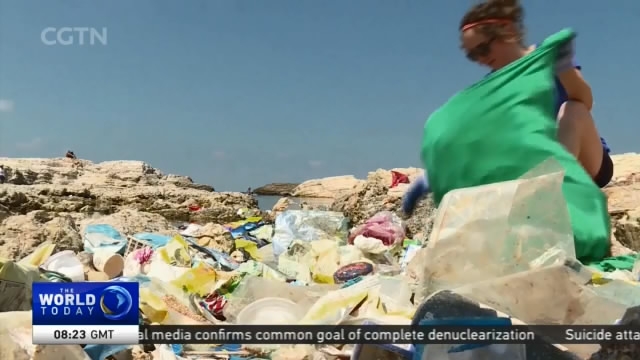
17:38, 28-Apr-2018
UK Plastics Pledge: Supermarkets and food companies join to tackle plastics crisis
02:37

An international effort to tackle the global plastics crisis has been launched in the UK. Supermarkets and food companies have joined a new voluntary pledge to make all plastic wrapping either recyclable or compostable by 2025. Some of the world's biggest names in the food and drinks industry have signed up for the initiative. Richard Bestic reports from London.
This is a first response to a growing political and public backlash against an industry seen as guilty for a plastics pollution crisis in the oceans and on land. The goal, according to the UK government-backed body, WRAP, to eliminate avoidable plastic waste within seven years.
HELEN BIRD WRAP RECYCLING CHARITY "Recycling facilities take years to build. And changing packaging lines is not something that can happen overnight. So we do have to be realistic. We also need to make sure that we maintain momentum and the time to act is now."
In Britain the food and drinks industry produces some 2.2. million tonnes of plastic waste every year. Less than half of it recycled. It's a global problem. Here on Indonesia's famous tourist island of Bali, a divers paradise, the glorious inhabitants of the sea must share their space with plastic trash. And across the globe in Mexico, they're making fantasy gardens out of plastic waste carrying a dark message. International Environmentalists are pressing for the British idea to be picked up worldwide.
ROB OPSOMER ELLEN MACARTHUR FOUNDATION "An international network of country initiatives similar to the one in the UK, bringing together businesses, governments, other stakeholders all with a common vision."
In Britain, 42 of the countries biggest retailers and producers have signed the so-called "plastics pledge". Representing 80 percent of the marketplace in Britain, they've agreed that by 2025, if packaging can't be reused, recycled or composted, it'll be banned.
RICHARD BESTIC LONDON "Regardless of the long lead in time, environmentalists will applaud this initiative from the British Government. They'll also recognize, however, that to make a real impact, the model will have to be rolled out effectively around the world. Richard Bestic, CGTN, London."

SITEMAP
Copyright © 2018 CGTN. Beijing ICP prepared NO.16065310-3
Copyright © 2018 CGTN. Beijing ICP prepared NO.16065310-3